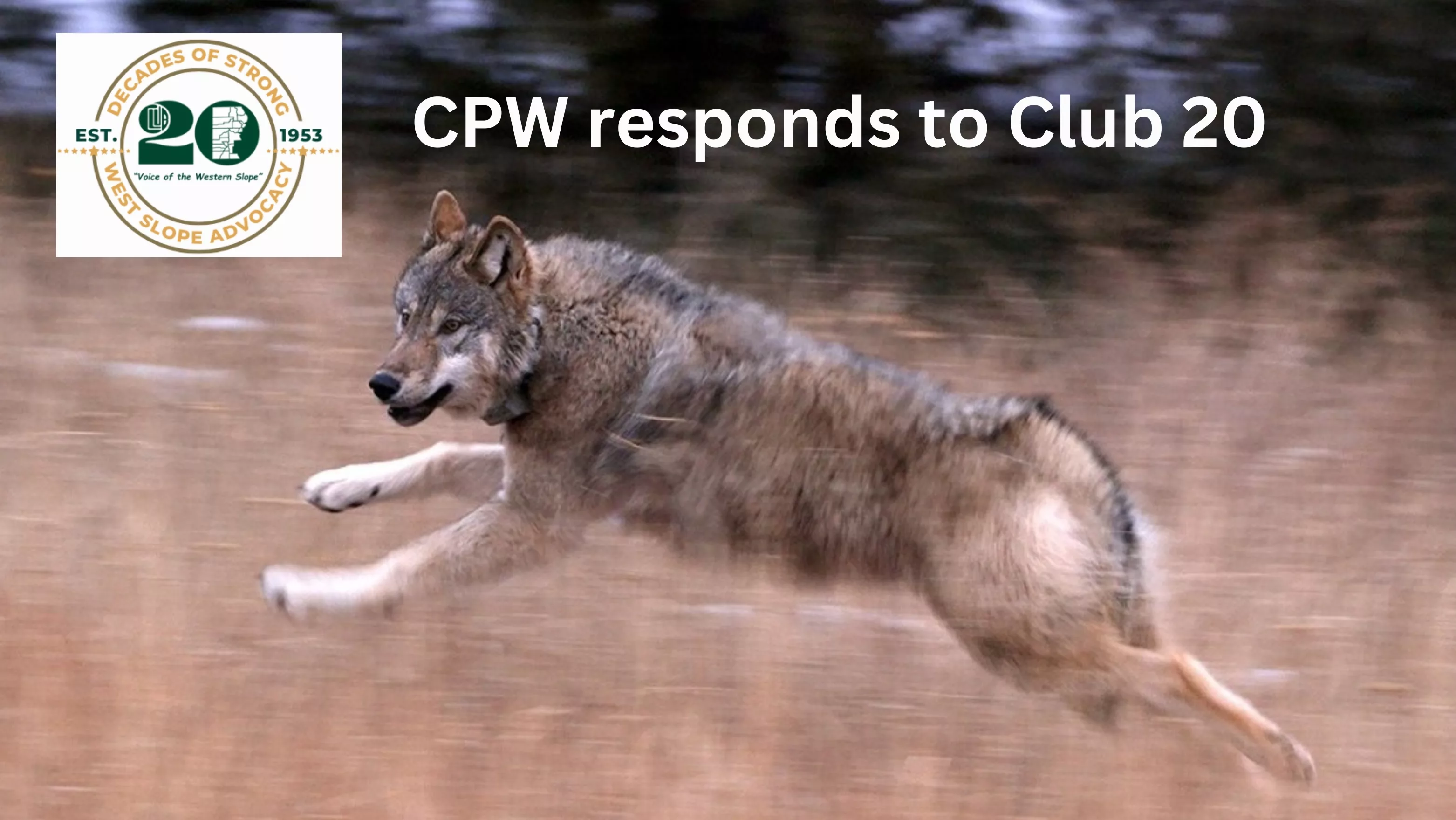
By Shannon Lukens.
Colorado Parks and Wildlife Director Jeff Davis has written a response letter to Club 20, regarding their concerns about wolf reintroduction and how it is happening.
On Sept. 27, Club 20, along with Middle Park Stockgrowers, Colorado Wool Growers Association, Colorado Cattlemen’s Association, Colorado Farm Bureau, and 26 other groups sent a Citizen Petition for Rulemaking to the Colorado Parks and Wildlife Commission. They asked CPW to adopt a rule, “that delays the further introduction of gray wolves in Colorado until Colorado’s wolf management program is equipped to handle the consequences of these introductions.”
In the letter dated Oct. 31, 2024, Director Davis says a definition of chronic depredation is expected this month (November 2024). He also says pausing wolf reintroduction would not be consistent with Proposition 114.
The letter is below. Here are a few key points.
- Director Davis says CPW staff is working to finalize a definition of chronic depredation, with close coordination from the Ad Hoc Working Group. “We anticipate putting the definition into place in Nov. 2024.”
- Director Davis spoke of the mandate under Proposition 114, “to establish, maintain, and manage a self-sustaining population of wolves in Colorado. We do not believe pausing wolf releases is consistent with that mandate.” The letter goes on to say more wolves on the ground will contribute to pack formation, creating wolf territories and more predictable wolf travel and behavior patterns.
- Of the ten wolves translocated from Oregon, three have died. And more could die. “Such a small number of wolves cannot adequately serve as a founding population to a self-sustaining population. Pausing releases for a year would essentially set us back to square one, at considerable cost that will only have to be duplicated as CPW continues to work to meet the mandates of state statute.”
- Director Davis writes, “We have heard and acknowledge the ranching communities’ and counties’ frustrations regarding transparency.” He says staff has been instructed to share wolf activity information with landowners in the areas of that activity and CPW has a communication plan for new wolf releases.
- Director Davis says six conflict specialists have been hired and are being trained. Four to five more are in the process of being hired.
- “Be aware, however, that CPW will never be able to provide ‘certainty’ to ranchers about the safety and well-being of their herds,” said Director Davis.
- CPW is working on developing proactive programs to support ranchers, “in avoiding and minimizing impacts to their livestock.” This is with CPW, the Colorado Department of Agriculture, and/or wildlife Services.
- He says all depredation claims have been paid to date, but they are expecting more when producers bring their livestock back from allotments.
Director Davis expressed disappointment that Club 20 feels CPW has “broken” the bond with rural landowners. “Please know that CPW is working diligently to navigate the implementation of the wolf restoration law with full knowledge of how difficult this has been for rural communities. These relationships are critically important to us, to both wolf and non-wolf conservation outcomes, to wildlife management generally, and to the broader public.” He then says he hopes Club 20 will “continue to invest your energy to work with us as a partner in this effort going forward.”
The next meeting for the Colorado Parks and Wildlife Commission is Nov. 14-15 in Lamar, Colo. One document listed on the meeting page is, “RULE-MAKING NOTICE – PARKS AND WILDLIFE COMMISSION MEETING – November 14-15, 2024.”
The CPW website says a full agenda will be available on or after Nov. 4.
Club 20’s website says, “We are the Voice of the Western Slope.” Club 20 is a coalition of individuals, businesses, tribes and local governments in Colorado’s 22 western counties. The group is organized for the purpose of speaking with a single unified voice on issues of mutual concern. Its activities include marketing and advertising, public education, promotion, meetings and events and political action.
Oct. 31, 2024 Letter to Club 20 Executive Director Brittany Dixon from Colorado Parks and Wildlife Director Jeff Davis
October 31, 2024
RE: Response to September 3, 2024 Wolf Concerns
Dear Executive Director Dixon,
Thank you for your letter describing Club 20’s concerns and recommendations regarding the ongoing wolf restoration law and the associated restoration plan. My sincerest apologies for the delay in my response. I have focused my time on ensuring that we are making progress on the concerns we have heard from producers and counties. Please find our response to these concerns below.
Proposition 114 requires Colorado Parks and Wildlife (CPW) to establish a self-sustaining population of wolves in Colorado. In carrying out this mandate, CPW must also use funds made available to assist owners of livestock in preventing and resolving conflicts between gray wolves and livestock. Since Proposition 114 passed in 2020, CPW has been striving to fulfill both of these goals, and continues to do so. Be aware, however, that CPW will never be able to provide “certainty” to ranchers about the safety and well-being of their herds. With wolves on the landscape, CPW and ranchers must work in tandem to minimize the risks posed to livestock by wolves. Only with a strong partnership can we, together, keep herds as safe as possible. But we will never achieve certainty; that is why we also have a compensation program for the unfortunate instances of wolf depredation that may occur despite our partnership’s best efforts.
In our role in this partnership, I want you to know that we have been listening to and acknowledge your concerns. CPW (including the Wolf Restoration Ad Hoc Working Group), the Colorado Department of Agriculture (CDA), USDA Wildlife Services, and NGOs have been working on solutions to the concerns that we have heard from ranchers and counties. Indeed, we had been doing so long before the Parks and Wildlife Commission received the recent citizen’s petition identifying concerns and needs prior to releasing new wolves, many of which overlap with those in your letter.
Our work to date has focused on many of these specifics. First, we have heard and acknowledge the ranching communities’ and counties’ frustrations regarding transparency. CPW has reinforced with our staff that they are able to share wolf activity information with landowners in the areas of that activity. Additionally, we have put several plans into place to enhance transparency, such as a communication plan for new wolf releases centered around an opportunity to dialogue with counties and producers on future wolf releases and wolf activities.
Second, our staff is close to finalizing a definition of chronic depredation, as well as a lethal management framework associated with the definition. We anticipate putting the definition into place in November 2024. This definition has been developed in close coordination with the Ad Hoc Working Group, which has members of the ranching community serving on it, and should provide clearer expectations for ranchers about how and when CPW will respond to wolf depredations.
Third, we are working in tandem with CDA on formalizing range rider and carcass management programs, including establishing adequate funding for those programs. We have also developed a site vulnerability assessment program that is ready to be deployed beginning November/December 2024.
Fourth, we have already hired 6 conflict specialists and are in the process of training them. We are also in the process of adding an additional 4-5 conflict specialists. These new hires will double our current capacity and increase CPW’s ability to respond to and investigate livestock depredations.
Fifth, we have focused on developing proactive programs to support ranchers in avoiding and minimizing impacts to their livestock. This includes working with CPW, CDA and/or Wildlife Services to develop site vulnerability assessments which also identify the most effective non-lethal techniques to avoid and minimize conflicts between wolves and livestock. These agencies and NGOs can assist in providing funding, training, equipment and potential deployment of techniques.
Lastly, we believe we already have a timely and workable reimbursement program, but I am interested in hearing suggestions for improving it. Our records indicate that CPW has paid all of the claims filed in 2024 and 2025 to date. We also anticipate receiving additional claims as producers bring their livestock back from allotments.
While we anticipate these products, programs and capacities will be rolling out into late fall/early winter, we want to acknowledge that our plan appropriately calls for adaptive management. Thus, we anticipate that we can sit down with local communities as we move forward in a manner that allows us to adjust our programs as we learn about what works best for local conditions.
In addition to all this, however, CPW needs to be mindful of its mandate under Proposition 114 to establish, maintain, and manage a self-sustaining population of wolves in Colorado. We do not believe pausing wolf releases is consistent with that mandate. Indeed, although it may seem counterintuitive, getting more wolves on the landscape will advance two of our goals: creating a self-sustaining population of wolves and creating an environment that has more predictable wolf travel patterns, and therefore more efficient management of wolf-livestock conflict. As we learned from wolf reintroduction in the northern Rockies, more wolves on the ground will contribute to pack formation, which will create wolf territories, and therefore more predictable wolf travel and behavioral patterns. Currently we have individuals or loose pairs of animals traveling 100-200 miles per week, which makes it challenging to predict where wolves will be and thus how to deploy co-existence techniques and strategies to avoid/minimize conflicts with livestock. Establishment of packs will create territories that are defended and where wolves will demonstrate more contained and consistent travel and behavioral patterns. More consistent travel patterns will allow us to better align site vulnerability assessments and techniques to reduce the likelihood of wolf-livestock conflicts.
As you are aware, three of the 10 translocated wolves from Oregon have died since their release last December. This is not a startling number – mortality is natural even in wildlife management and restorations. However, if we were to pause, it is likely that additional wolves from this preliminary source will also die before having the opportunity to pair and breed, making it harder to achieve Proposition 114’s mandate to establish a self-sustaining population of wolves in Colorado. Please recall that while CPW had the opportunity to supplement the 10 wolves initially released last December with an additional 5 from the Confederated Tribes of the Colville Reservation later in the season, after requests from producers and elected officials, we agreed to stop at 10 for the first release season. Ten has become 7, and 7 may become 5 or even 4. Such a small number of wolves cannot adequately serve as a founding population to a self-sustaining population. Pausing releases for a year would essentially set us back to square one, at considerable cost that will only have to be duplicated as CPW continues to work to meet the mandates of state statute.
Finally, I am deeply disappointed to continue to hear your perspective that CPW has “broken” our bond with rural landowners, especially given all the efforts that have taken place over multiple decades to strengthen these relationships and achieve multiple benefits together over that time. Please know that CPW is working diligently to navigate the implementation of the wolf restoration law with full knowledge of how difficult this has been for rural communities. These relationships are critically important to us, to both wolf and non-wolf conservation outcomes, to wildlife management generally, and to the broader public. To see the long-standing relationships with rural landowners and producers jeopardized after just the first year of wolf reintroduction is frustrating and alarming. CPW is committed to the hard work needed to to rebuild these relationships, and we request that you continue to invest your energy to work with us as a partner in this effort going forward.
Again, I thank you for continuing to share your concerns and your continued dedication to our long-standing relationships.
Sincerely,
Jeff Davis, Director
Colorado Parks and Wildlife
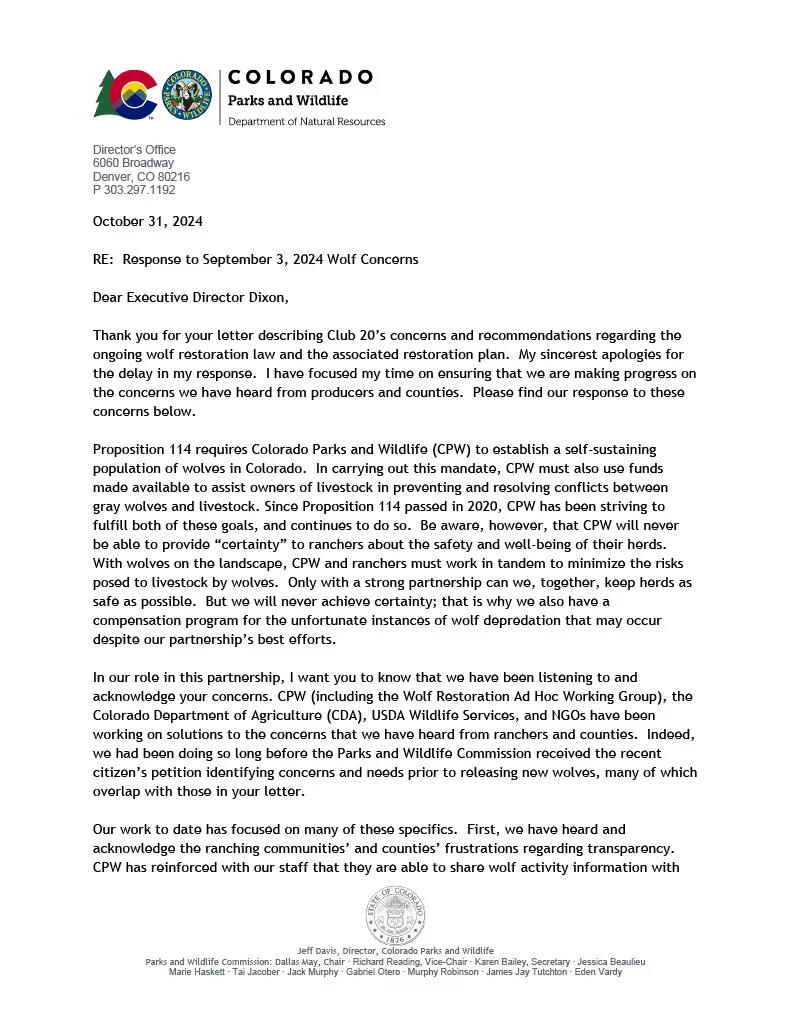
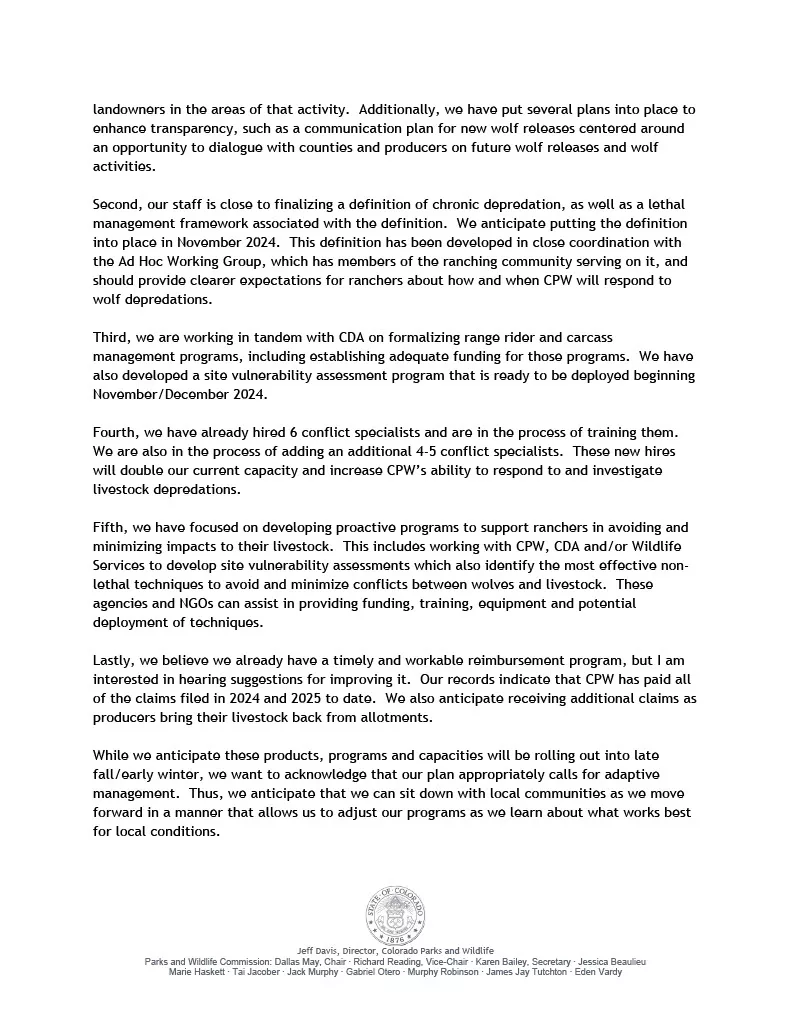
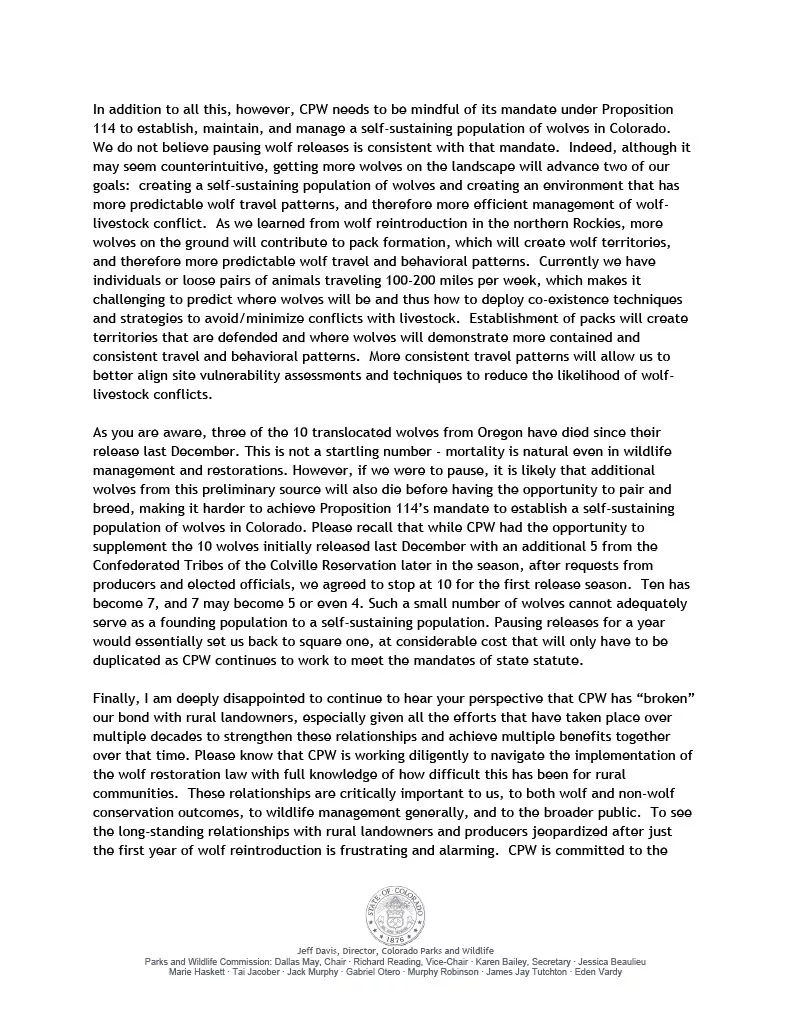
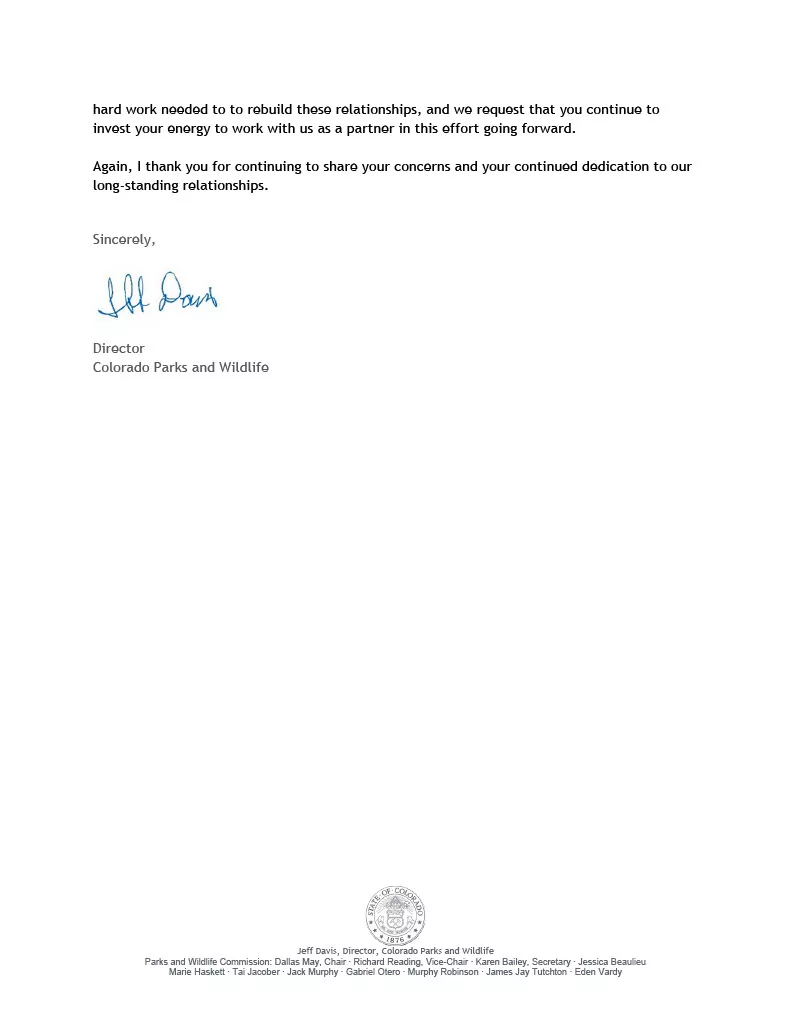
Steamboat Radio News Past Coverage of wolves in Colorado
- Oct. 15, 2024 — Livestock producers have access to livestock protection dogs for free from USDA
- Oct. 11, 2024 — Fifth wolf pup has not been captured
- Oct. 8, 2024 — CPW Commission gets another letter asking to pause wolf reintroduction
- Oct. 6, 2024 — CPW Commission hears wolf updates at meeting
- Sept. 30, 2024 –– A 5th wolf pup is spotted in Grand County and will be captured by CPW
- Sept. 30, 2024 — Colorado Ag Organizations petition CPW Commission before further wolf releases happen
- Sept. 26, 2024 — No producers show for first Non-Lethal Wolf Conflict Reduction Training Meeting
- Sept. 23, 2024 — CPW confirms a cow and a calf killed by wolves in Grand County
- Sept. 16, 2024 — The Wolf Conflict Reduction program is hiring two field specialists
- Sept. 14, 2024 — The next set of wolves coming to Colorado will be from Canada
- Sept. 13, 2024 — Middle Park Stockgrowers ask CPW not to release any more wolves there
- Sept. 12, 2024 — Another wolf is dead in Grand County
- Sept. 10, 2024 — Grand County ranchers are reporting more wolf kills
- Sept. 9, 2024 — The Copper Creek Wolf Pack has been captured and CPW says the adult male was unhealthy and has died
- Sept. 9, 2024 –– Ranchers with the most wolf depredations ask U.S. Fish & Wildlife to take over wolf management
- Aug. 27, 2024 — The Copper Creek Wolf Pack is getting rounded up and relocated
- Aug. 23, 2024 — CPW confirms the next wolves introduced will again be in Northern Colorado
- July 31, 2024 — Eight more sheep confirmed killed by wolves in Grand County
- July 31, 2024 — Colville Tribe says they won’t send wolves to Colorado now
- July 29, 2024 — Two more sheep die from wolves in Grand County
- June 24, 2024 — CPW REPORTS LESS WOLF ACTIVITY IN ROUTT AND NONE IN MOFFAT
- June 20, 2024 — WOLF PUP CONFIRMED IN GRAND COUNTY
- June 19, 2024 — CPW CONFIRMS SOUTH ROUTT WOLF KILL
- June 17, 2024 — PRODUCER REPORTS SUSPECTED WOLF KILL IN SOUTH ROUTT COUNTY
- June 16, 2024 — CPW DIRECTOR JEFF DAVIS ANSWERS QUESTIONS AT JACKSON COUNTY GATHERING
- June 13, 2024 — CPW TO FORM WORKING GROUP REGARDING WOLF RESTORATION
- June 12, 2024 — NORTH PARK PRODUCER WHO LOSES CALF SPEAKS OUT
- June 10, 2024 — CPW CONFIRMS ANOTHER WOLF DEPREDATION IN JACKSON COUNTY THIS WEEKEND
- June 5, 2024 — Wolf Video posted from Grand County
- May 26, 2024 — DON GITTLESON SAYS ANOTHER CALF HAS BEEN KILLED BY WOLVES ON HIS RANCH
- May 15, 2024 — HERE’S THE LATEST LETTER TO MIDDLE PARK STOCKGROWERS FROM CPW DIRECTOR DAVIS
- May 14, 2024 — Suspected mountain lion kills the collared wolf
- May 6, 2024 — MIDDLE PARK STOCKGROWERS SEND EIGHT-PAGE LETTER TO CPW
- April 30, 2024 — GRAND COUNTY RANCHERS TO GET HELP WITH PROTECTING THEIR LIVESTOCK
- April 30, 2024 — NORTH PARK STOCKGROWERS SEND ANOTHER LETTER TO CPW AND GOV. POLIS
- April 28, 2024 —ANOTHER WOLF KILL IN GRAND COUNTY SUNDAY
- April 24-2024 — COLLARED GRAY WOLF ACTIVITY MAP RELEASED FOR APRIL
- April 23, 2024 — A WOLF HAS DIED, AND MIDDLE PARK STOCKGROWERS HEAR FROM CPW
- April 22, 2024 — MULTIPLE LETTERS SENT TODAY TO GOVERNOR POLIS AND CPW ASKING FOR ACTION ON WOLVES
- April 18, 2024 — FOUR MORE HEAD OF LIVESTOCK KILLED BY WOLVES IN GRAND COUNTY
- April 9, 2024 — AG PRODUCERS MEET WITH CPW OFFICIALS IN KREMMLING ABOUT WOLVES
- April 8, 2024 — ANOTHER CALF KILLED BY A WOLF OR WOLVES IN JACKSON COUNTY
- April 3, 2024 — A WOLF OR WOLVES HAVE KILLED A NEWBORN CALF IN GRAND COUNTY
- April 3, 2024 — Denver 7 Calf killed in first confirmed report of gray wolf depredation since wolves were released in December
- Feb. 29, 2024 — COLORADO PARKS AND WILDLIFE OFFICIALS COME TO STEAMBOAT SPRINGS TO TALK WOLVES
- Jan. 30, 2024 — CPW SENDS UPDATE ON WOLF SIGHTINGS SINCE 2004, AND MORE ON THE MAP
- Jan. 24, 2024 — ELECTED OFFICIALS GRILL DEPT. OF NATURAL RESOURCES AND CPW AT HEARING WEDNESDAY
- Jan. 22, 2024 — CPW GETS HARSH LETTER DEMANDING ANSWERS FROM ROBERTS AND MCCLUSKIE
- Jan. 19, 2024 — COLORADO’S NEXT WOLVES TO BE REINTRODUCED WILL BE FROM TRIBAL LANDS IN WASHINGTON
- Jan. 12, 2024 — CPW CONFIRMS WOLVES WERE IN SOUTH ROUTT BUT AREN’T (YET) IN MOFFAT
- Dec. 22, 2023 — FIVE MORE WOLVES ARE RELEASED BY COLORADO PARKS AND WILDLIFE
- Dec. 22, 2023 — CPW DENIES GITTLESON’S REQUEST TO IMPLEMENT 10(J) RULE ON JACKSON COUNTY WOLVES
- Dec. 21, 2023 — THREE OF THE FIVE WOLVES RELEASED IN COLORADO WERE IN PACKS THAT KILLED OR INJURED LIVESTOCK IN OREGON
- Dec. 19, 2023 — LIVESTOCK PRODUCERS RECEIVE WOLF UPDATE FROM CPW IN CRAIG MONDAY
- Dec. 13, 2023 — GITTLESON SAYS ANOTHER CALF WAS ATTACKED BY A WOLF TODAY
- Dec. 11, 2023 — COMPLAINT FILED IN U.S. DISTRICT COURT TO STOP WOLF REINTRODUCTION IN COLORADO
- Dec. 4, 2023 — KEEP YOUR PETS CLOSE AND CARRY A BIG STICK – CPW HAS ADVICE FOR LIVING WITH WOLVES
- Nov. 19, 2023 — THREE LAMBS KILLED BY A WOLF IN JACKSON COUNTY, SAYS RANCHER
- Nov. 17, 2023 – CPW AND CDA ANNOUNCE AGREEMENT TO WORK TOGETHER ON WOLF REINTRODUCTION
- Nov. 7, 2023 – U.S. FISH AND WILDLIFE SETS DATE FOR 10J RULE FOR WOLVES
- Oct. 6, 2023 – COLORADO WILL RECEIVE WOLVES FROM OREGON
- May 16, 2023 – POLIS VETOES 10J RULE WOLF BILL
- May 3, 2023 – CPW COMMISSION APPROVES FINAL WOLF RESTORATION AND MANAGEMENT PLAN
- May 2, 2023 – MANAGEMENT OF GRAY WOLVES REINTRODUCTION BILL PASSES IN STATE HOUSE
- May 2, 2023 –CPW MEETS THIS WEEK FOR FINAL WOLF MANAGEMENT PLAN
- April 27, 2023 – CPW CONFIRMS WOLF SIGHTING EAST OF KREMMLING
- April 8, 2023 – CPW WOLF COMMISSION MEETS IN STEAMBOAT SPRINGS
- April 3, 2023 – CPW TO PRESENT FINAL DRAFT WOLF RESTORATION AND MANAGEMENT PLAN IN STEAMBOAT SPRINGS
- March 28, 2023 – THE SOUTHERN UTE TRIBE ASKS THAT CPW RELEASES WOLVES ALONG I-70 CORRIDOR
- March 15, 2023 – TWO DOGS DIE FROM WOLVES IN JACKSON COUNTY THIS WEEK
- March 3, 2023 –COLORADO PARKS AND WILDLIFE COMMISSION RELEASES WOLF REINTRODUCTION MEETING RECAP
- Feb. 21, 2023 —WOLF 2101 RECAPTURED AND RECOLLARED IN JACKSON COUNTY
- Feb. 21, 2023 —10J RULE MEETINGS WITH REGARDS TO WOLVES SCHEDULED FOR NW COLORADO BY US FISH AND WILDLIFE
- Jan. 17, 2023 —STATE LEGISLATORS HEAR MORE ON WOLF REINTRODUCTION AT JOINT COMMITTEE HEARING
- Dec. 13, 2022 —MORE WOLVES VISIT GITTLESON PROPERTY IN JACKSON COUNTY THIS WEEK
- Dec. 12, 2022 —NORTH PARK RANCHERS MEET WITH CPW REGARDING WOLF REINTRODUCTION PLAN
- Dec. 10, 2022 —CPW RELEASES DRAFT COLORADO WOLF RESTORATION AND MANAGEMENT PLAN
- Nov. 19, 2022 —ANOTHER WOLF ATTACK REPORTED IN JACKSON COUNTY
- Oct. 9, 2022 —WOLVES ATTACK CALVES IN RIO BLANCO AND JACKSON COUNTIES
- July 14, 2022 —CPW UPDATES THE WOLF PACK IN JACKSON COUNTY
- June 20, 2022 ––WOLF MANAGEMENT DISCUSSED AT MEETING IN WALDEN
- June 15, 2022 —WOLVES IN NORTH PARK ARE SUBJECT AT MEETING MONDAY, JUNE 20
- May 30, 2022 —THE GITTLESON RANCH LOSES ANOTHER CALF TO WOLVES, THEY SAY
- May 5, 2022 —AT LEAST TWO MORE CALVES KILLED BY WOLVES ON GITTLESON RANCH
- May 10, 2022 ––THIRD CALF DIES ON JACKSON COUNTY RANCH; CPW DOES NECROPSY
- April 11, 2022 —A NEW LITTER OF WOLF PUPS IS EXPECTED IN JACKSON COUNTY
- March 17, 2022 —WOLVES ATTACK ANOTHER DOMESTIC COW IN JACKSON COUNTY
- Feb. 10, 2022 – MONTANA STOCKGROWERS VOICE SUPPORT FOR COLORADO RANCHERS OVER THE WOLVES
- Feb. 9, 2022 – WOLF MANAGEMENT DISCUSSED BY LOCAL RANCHERS AND OFFICIALS AT FORUM IN STEAMBOAT
- Jan. 22, 2022 – WOLF MITIGATION OPTIONS
- Jan. 19, 2022 – ANOTHER COW KILLED OVERNIGHT IN NORTH PARK BY WOLVES
- Jan. 18, 2022 – TWO MORE COWS ATTACKED BY WOLVES IN JACKSON COUNTY TUESDAY
- Jan. 12, 2022 – CPW ALLOWS WOLVES TO BE HAZED IN EMERGENCY DECLARATION
- Jan. 10, 2022 – A WOLF PACK KILL IS REPORTED IN JACKSON COUNTY OVER THE WEEKEND
- June 9, 2021 – WOLF DEN WITH PUPS CONFIRMED IN NW COLORADO